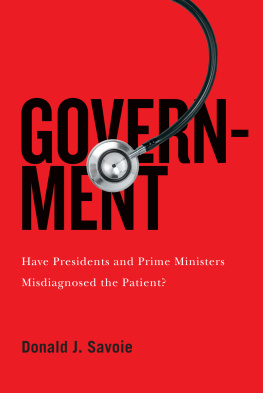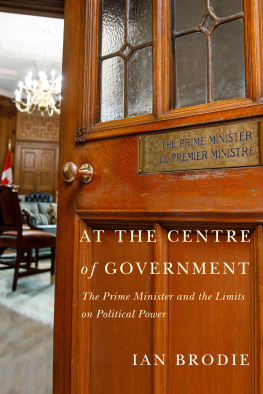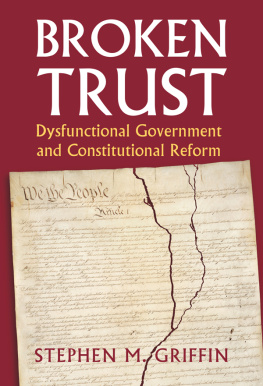Contents
Page List
Guide

GOVERNMENT
MCGILL-QUEENS/BRIAN MULRONEY INSTITUTE OF GOVERNMENT STUDIES IN LEADERSHIP, PUBLIC POLICY, AND GOVERNANCE
Series editor: Donald E. Abelson
Titles in this series address critical issues facing Canada at home and abroad and the efforts policymakers at all levels of government have made to address a host of complex and multifaceted policy concerns. Books in this series receive financial support from the Brian Mulroney Institute of Government at St Francis Xavier University; in keeping with the institutes mandate, these studies explore how leaders involved in key policy initiatives arrived at their decisions and what lessons can be learned. Combining rigorous academic analysis with thoughtful recommendations, this series compels readers to think more critically about how and why elected officials make certain policy choices, and how, in concert with other stakeholders, they can better navigate an increasingly complicated and crowded marketplace of ideas.
- Braver Canada
Shaping Our Destiny in a Precarious World
Derek H. Burney and Fen Osler Hampson - The Canadian Federal Election of 2019
Edited by Jon H. Pammett and Christopher Dornan - Keeping Canada Running
Infrastructure and the Future of Governance in a Pandemic World
Edited by G. Bruce Doern, Christopher Stoney, and Robert Hilton - The Age of Consequence
The Ordeals of Public Policy in Canada
Charles McMillan - Government
Have Presidents and Prime Ministers Misdiagnosed the Patient?
Donald J. Savoie
GOVERNMENT
Have Presidents and Prime Ministers Misdiagnosed the Patient?
DONALD J. SAVOIE
McGill-Queens University Press
Montreal & Kingston London Chicago
McGill-Queens University Press 2022
ISBN 978-0-2280-1109-5 (cloth)
ISBN 978-0-2280-1342-6 (ePDF)
ISBN 978-0-2280-1343-3 (ePUB)
Legal deposit second quarter 2022
Bibliothque nationale du Qubec
Printed in Canada on acid-free paper that is 100% ancient forest free (100% post-consumer recycled), processed chlorine free
This book has been published with the help of a grant from the Canadian Federation for the Humanities and Social Sciences, through the Awards to Scholarly Publications Program, using funds provided by the Social Sciences and Humanities Research Council of Canada.
We acknowledge the support of the Canada Council for the Arts.
Nous remercions le Conseil des arts du Canada de son soutien.
Library and Archives Canada Cataloguing in Publication
Title: Government : have presidents and prime ministers misdiagnosed the patient? / Donald J. Savoie.
Names: Savoie, Donald J., 1947 author.
Series: McGill-Queens/Brian Mulroney Institute of Government studies in leadership, public policy, and governance ; 5.
Description: Series statement: McGill-Queens/Brian Mulroney Institute of Government studies in leadership, public policy, and governance ; 5 | Includes bibliographical references and index.
Identifiers: Canadiana (print) 20210390786 | Canadiana (ebook) 20210390956 | ISBN 9780228011095 (cloth) | ISBN 9780228013426 (ePDF) | ISBN 9780228013433 (ePUB)
Subjects: LCSH: Power (Social sciences) | LCSH: Comparative government. | LCSH: Bureaucracy.
Classification: LCC JC330.S28 2022 | DDC 303.3dc23
This book was typeset in 10.5/13 Sabon.
Contents
Preface
I began thinking about this book thirty years ago. I was asked by a Government of Canada agency to work with colleagues to assemble different teams of leading scholars from Europe, the United States, Australia, New Zealand, and Canada to review various measures governments in several countries introduced to overhaul their operations. The teams published three books of essays on governance and public administration. The experience piqued my interest in comparative research.
My research interest led me to Paris (at OECD); to several visits to Washington, DC, to carry out interviews; to extended stays in Britain (Oxford and London); and to Ottawa, Canada, for several years as a visiting fellow in a central agency and as deputy head of a Management Development Centre with the Government of Canada. This book flows out from the encounters and interviews I conducted over the years with government officials.
What struck me from the experience was how career civil servants react to change. I soon realized that it was simply not possible to define an all-encompassing theory to explain their behaviour. Public choice theory and the politics-administration dichotomy theory explain some situations some of the time but not all situations all the time. We still do not have a grand general theory to explain the behaviour of government officials, and I do not see one on the horizon.
This is not to suggest that the public administration field has little to offer. In fact, it has a great deal to offer, and we should continue working toward a general theory. Examining what works and what does not is a step in that direction. It is a good thing the medical profession does not await the perfection of a grand general theory of public health before treating individual patients for particular maladies.
I am convinced that a comparative perspective offers the best prospects to gain new insights into how government decides and why changes are introduced in government, and to understand better the evolving relationships between politicians and career officials.
I cannot possibly thank everyone who assisted me in my research. I owe a great deal to all those who travelled the territory before me, and I acknowledge many intellectual debts in the notes. Others, however, are not so formally acknowledged. I want to thank present and former government officials in Britain, the United States, Canada, and France who gave so generously of their time over the past thirty years. This book would have not been possible without their assistance and insights.
Two colleagues at my university Gabriel Arsenault and Roger Ouellette read the manuscript and made important suggestions to improve the study. I owe a special debt to the three anonymous reviewers who made a number of constructive criticisms of an earlier draft of this study. The book greatly benefitted from their comments and suggestions.
As always, my wife, Linda, accepted with good cheer my decision to write this book. I can hardly overstate what her encouragement means to me. I also owe a special thank you to two assistants, Cline Basque and Ginette Benoit, for their continued support and for their uncanny ability to read my handwriting. Paula Sarson made many editorial suggestions and made many sentences read better.
DONALD J. SAVOIE
Universit de Moncton
GOVERNMENT
Introduction
Trust in the institutions of public governance throughout the Western world has been in decline in recent years. Here, we look at four countries: the United States, Great Britain, France, and Canada to understand why. These four countries have distinct institutions shaped by distinct histories: the United States has a presidential system, France has a semi-presidential system, and Great Britain and Canada have a Westminster-inspired parliamentary system. The United States and Canada are federal states. France is a unitary state, and Great Britain now has a quasi-federal system. All four have a professional non-partisan civil service, though there are sharp differences in how they operate.















